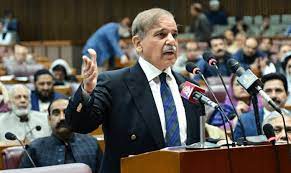ISLAMABAD: Pakistan’s Parliament on Thursday passed a Bill to curb the powers of the Chief Justice of the Supreme Court regarding suo motu cases and the constitution of Benches in a significant move to rein in the top judiciary amid criticism by the Opposition.
Minister for Law and Justice Azam Nazeer Tarar introduced The Supreme Court (Practice and Procedure) Bill, 2023, on Thursday in the Senate, a day after it was passed by the National Assembly — the lower House of Parliament.
There were 60 votes in favour of the Bill and 19 against it. The Bill will now be presented to President Arif Alvi for his assent.
Senators from former Prime Minister Imran Khan’s Pakistan Tehreek-e-Insaf (PTI) party opposed the Bill in the Senate, saying it was in violation of the Constitution as matters related to the Supreme Court could be dealt with amendments in the Constitution through a one-third majority.
“You cannot change the system of the Supreme Court through a law passed by simple majority,” Senator Ali Zafar of the PTI said during the debate, as he also demanded that the Bill should be sent to a bipartisan Senate committee to discuss it before putting it up for voting.
However, his concerns were overruled and the Bill was passed.
The PTI senators protested against the move and Ali Zafar warned that it would be challenged in the Supreme Court which he was sure would strike it down.
The Bill states that every cause, matter or appeal before the apex court would be heard and disposed of by a Bench constituted by a committee comprising the Chief Justice and the two senior-most judges. It added that the decisions of the committee would be taken by a majority.
Regarding exercising the apex court’s original jurisdiction, called suo motu powers, the Bill said that any matter invoking the use of Article 184(3) would first be placed before the committee.
“If the committee is of the view that a question of public importance with reference to enforcement of any of the fundamental rights conferred by Chapter I of Part II of the Constitution is involved, it shall constitute a Bench comprising not less than three judges of the Supreme Court of Pakistan, which may also include the members of the committee, for adjudication of the matter,” the Bill reads.
Currently, the Chief Justice takes decisions about the use of suo motu powers and also constitutes various Benches to hear cases.
Earlier, the Bill was approved by the federal Cabinet on March 28 and presented in the National Assembly, which passed it on Wednesday.


